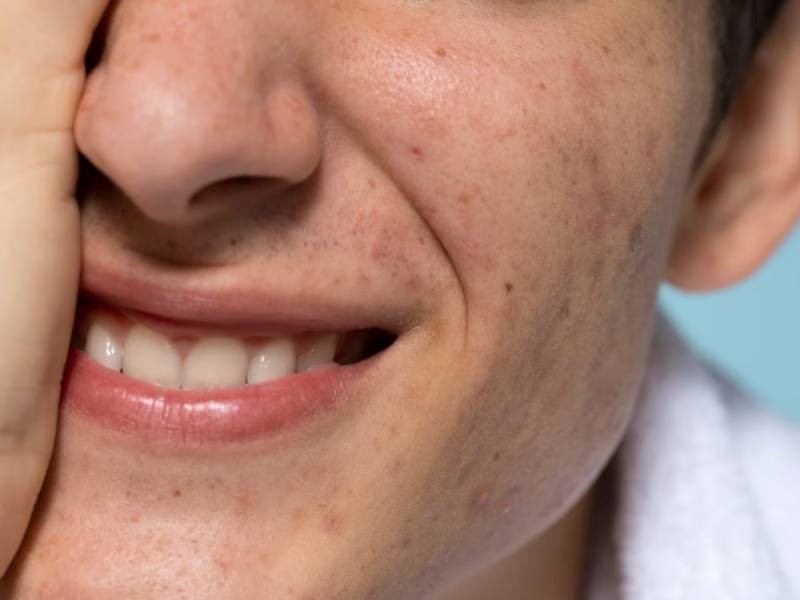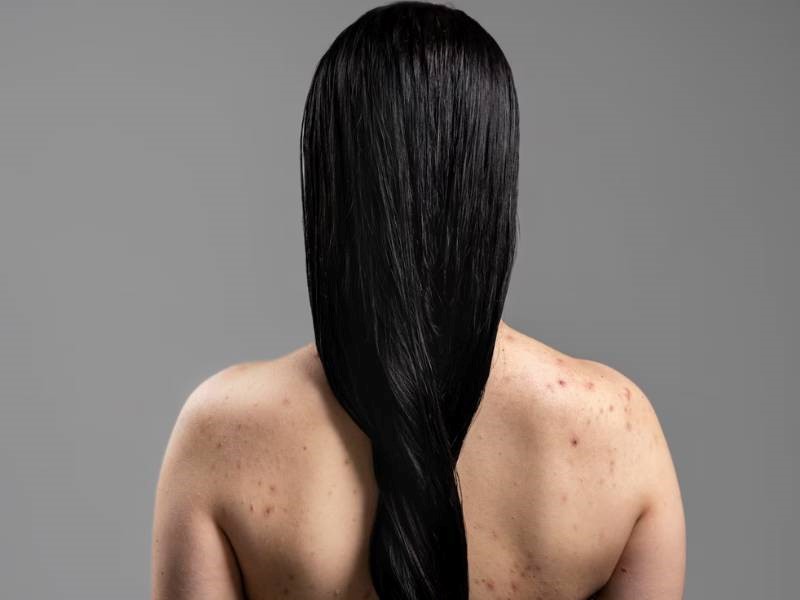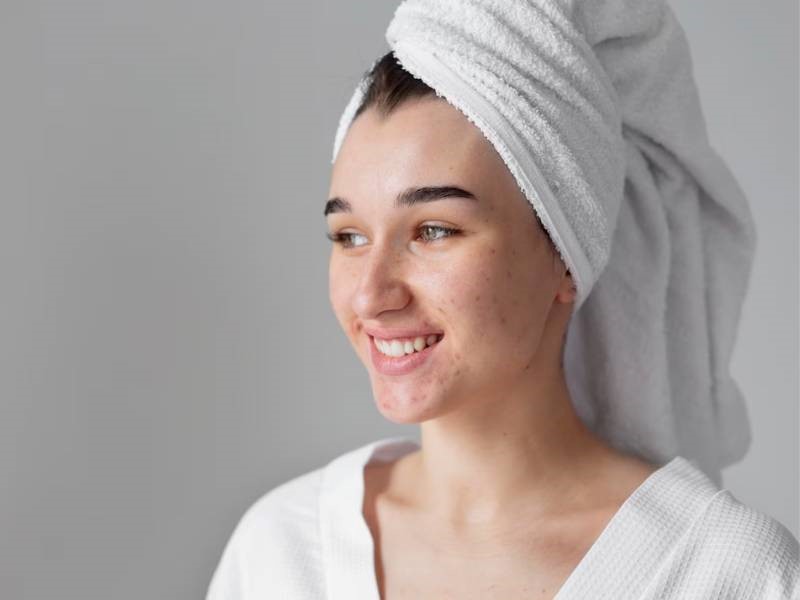Acne scars are a common and often distressing result of acne, a chronic inflammatory skin disease. These scars can have a significant impact on a person’s self-esteem and quality of life, making effective treatments essential. There are several types of acne scars, each with its own unique characteristics and treatment options. Effective treatment options include topical treatments, invasive procedures, and natural remedies. Prevention is also key in avoiding the formation of scars, and early treatment of acne, proper wound care, and protecting the skin from sun damage can all help prevent the development of acne scars. This article will explore the different types of acne scars, their causes, and the top treatments for acne scars.
Definition of Acne Scars
Acne scars are a common consequence of acne, a chronic inflammatory skin disease affecting millions of people worldwide. Acne scars occur when the body’s natural healing response to inflammation and infection is disrupted, leading to the formation of permanent depressions or raised areas on the skin. They can have a significant impact on a person’s self-esteem and quality of life, and their treatment can be challenging.

Acne scars can be classified into three types: atrophic scars, hypertrophic scars, and keloids. Atrophic scars are the most common type and occur when the skin loses collagen during the healing process. Hypertrophic scars and keloids are less common and occur when the body produces too much collagen, resulting in raised scars.
Research has shown that acne scars can have a negative impact on a person’s mental health, with some individuals experiencing symptoms of anxiety and depression as a result of their appearance. In a study published in the Journal of the European Academy of Dermatology and Venereology, researchers found that individuals with acne scars had significantly lower quality-of-life scores than those without scars.
Effective treatment options for acne scars include topical treatments, invasive procedures, and natural remedies. However, prevention is also key in avoiding the formation of scars. Early treatment of acne, proper wound care, and protecting the skin from sun damage can all help prevent the development of acne scars.
Types of Acne Scars
There are several types of acne scars, each with its own unique characteristics and treatment options. Understanding the type of acne scar is crucial in determining the best course of treatment.

Here are the types of acne scars:
- Atrophic scars: Atrophic scars are the most common type of acne scars and occur when the skin loses collagen during the healing process. They appear as depressed areas on the skin and can be further classified as ice-pick scars, boxcar scars, or rolling scars.
- Hypertrophic scars: Hypertrophic scars are raised scars that occur when the body produces too much collagen during the healing process. They are less common than atrophic scars and are often seen in severe cases of acne.
- Keloid scars: Keloid scars are similar to hypertrophic scars but are larger and extend beyond the boundaries of the original wound. They are also less common than atrophic scars and are more commonly seen in individuals with darker skin tones.
- Post-inflammatory hyperpigmentation (PIH): PIH is not technically a scar, but it is a common complication of acne. It occurs when the skin produces too much melanin during the healing process, resulting in dark spots on the skin.
Effective treatments for acne scars depending on the type and severity of the scarring.
Causes of Acne Scars
Acne scars are caused by the body’s natural healing response to inflammation and infection in the skin. When acne lesions, such as pimples or cysts, are present, the body produces collagen fibers to repair the damaged skin tissue. However, in some cases, the body produces too much or too little collagen, leading to the formation of scars.

Several factors can contribute to the development of acne scars, including:
- Picking or squeezing acne lesions: Picking or squeezing pimples can damage the skin and increase the risk of scarring.
- Inflammation: Inflammation is a normal response to infection, but when it is prolonged or severe, it can lead to scarring.
- Genetics: Some individuals may be more prone to scarring due to genetic factors.
- Delayed or inadequate treatment: Delaying or inadequate treatment of acne can increase the risk of scarring.
- Sun exposure: Exposure to the sun’s ultraviolet rays can worsen the appearance of acne scars and increase the risk of new scarring.
Importance of Acne Scar Treatment
Treating acne scars is important not only for improving the appearance of the skin but also for promoting better mental health and well-being. Acne scars can have a significant impact on a person’s self-esteem and quality of life, leading to symptoms of anxiety and depression. In a study published in the Journal of the American Academy of Dermatology, researchers found that individuals with acne scars had a higher prevalence of anxiety and depression compared to those without scars.

Effective treatment of acne scars can help improve the appearance of the skin and reduce the negative psychological impact of scarring. Research has shown that treatments such as laser therapy, chemical peels, and micro-needling can significantly improve the appearance of acne scars. In a study published in Dermatologic Surgery, researchers found that patients treated with fractional laser therapy showed significant improvement in acne scars after three months.
Overall, treating acne scars is essential for improving both the physical and mental health of individuals affected by scarring. Consulting with a dermatologist can help individuals determine the best course of treatment for their specific type of acne scars.
Top Treatments for Acne Scars
Acne scars can be frustrating and difficult to treat, but there are many options available for those looking to improve the appearance of their skin. In this section, we will explore the top treatments for acne scars, including topical treatments and invasive procedures.
1. Topical Treatments
● Retinoids
Retinoids are a class of medications derived from vitamin A that are commonly used to treat acne and promote skin cell turnover. They have also been found to be effective in reducing the appearance of acne scars. Retinoids work by increasing collagen production, which helps to improve skin texture and reduce the appearance of scars. They also have anti-inflammatory properties, which can help to reduce redness and swelling.
● Alpha-hydroxy acids
Alpha-hydroxy acids (AHAs) are a group of natural acids found in foods such as citrus fruits and milk. They are commonly used in skincare products to exfoliate the skin and improve skin texture. AHAs work by releasing the bonds that hold dead skin cells together, allowing them to be easily removed from the skin’s surface. This process can help to reduce the appearance of acne scars by promoting the growth of new skin cells and improving skin texture.

● Vitamin C
Vitamin C is a powerful antioxidant that has been found to be effective in reducing the appearance of acne scars. It works by promoting collagen production and reducing inflammation. Vitamin C also has skin-brightening properties, which can help to improve the overall appearance of the skin.
● Hydroquinone
Hydroquinone is a skin-lightening agent that is commonly used to treat hyperpigmentation, including acne scars. It works by preventing the production of melanin, the pigment that gives skin its color. Hydroquinone can be found in over-the-counter skincare products, but it is also available in prescription strength for more severe cases of hyperpigmentation.
If you’re dealing with acne scars and seeking expert guidance, consider consulting a dermatologist specializing in acne dermatology through RemoteDerm. Our experienced dermatologists can assess your specific acne scar type and recommend personalized treatments to improve your skin’s appearance. Don’t let acne scars affect your self-esteem; take the first step towards clearer skin by getting an online consultation today.
2. Invasive Procedures
● Chemical Peels
Chemical peels involve the application of a chemical solution to the skin to exfoliate the top layer of dead skin cells. This process can help to reduce the appearance of acne scars by promoting the growth of new skin cells and improving skin texture. There are different types of chemical peels available, ranging from mild to deep, depending on the severity of the scarring.
● Microdermabrasion
Microdermabrasion is a non-invasive procedure that involves the use of a device to exfoliate the skin and improve skin texture. It works by blasting tiny crystals onto the skin’s surface, which helps to remove dead skin cells and promote collagen production. Microdermabrasion can be effective in reducing the appearance of mild to moderate acne scars.

● Dermabrasion
Dermabrasion is a more invasive procedure than microdermabrasion and involves the use of a device to remove the top layer of skin. This process can help to improve skin texture and reduce the appearance of acne scars. Dermabrasion is typically used for more severe cases of scarring.
● Laser Therapy
Laser therapy is a popular option for treating acne scars. It works by targeting the skin’s deeper layers with intense light energy, which stimulates collagen production and helps to reduce the appearance of scars. There are different types of laser therapy available, including fractional laser therapy and pulsed-dye laser therapy.
Overall, there are many options available for treating acne scars, ranging from topical treatments to invasive procedures. It is important to consult with a dermatologist to determine the best course of treatment for your specific type of scarring. With the right treatment plan, it is possible to improve the appearance of acne scars and achieve smoother, more even-toned skin.
3. Natural Remedies for Acne Scars
While medical treatments and procedures can be effective in treating acne scars, natural remedies can also help improve the appearance of scars. Consider the following natural remedies:
● Aloe Vera
Aloe vera is a natural plant extract that is commonly used in skincare products. It has anti-inflammatory and healing properties that can help reduce the appearance of acne scars. Apply aloe vera gel directly on the scars and leave it on for 30 minutes before washing it off with lukewarm water.
● Honey
Honey has natural antibacterial and anti-inflammatory properties, making it a great natural remedy for acne scars. Apply raw honey directly on the scars and leave it on for 10-15 minutes before washing it off with lukewarm water.

● Lemon Juice
Lemon juice contains natural alpha-hydroxy acids that can help lighten and brighten the skin. Apply fresh lemon juice on the scars and leave it on for 10-15 minutes before washing it off with lukewarm water. However, lemon juice can be irritating for some skin types, so it is important to do a patch test first.
● Rosehip Seed Oil
Rosehip seed oil is a natural oil that is rich in essential fatty acids and vitamins that can help improve the appearance of scars. Apply a small amount of rosehip seed oil on the scars and massage them gently. Leave it on overnight for best results.
It’s important to consult with a dermatologist or healthcare provider before using any natural remedies for acne scar treatment to determine the most effective course of treatment.
Tips for Preventing Acne Scars
Preventing acne scars is much easier than trying to treat them after they have formed. Here are some tips for preventing acne scars:
- Early Treatment of Acne
The earlier you treat your acne, the less likely it is to lead to scarring. To find the best course of treatment for your acne, consult a dermatologist.
- Proper Wound Care
If you do develop a pimple, it is important to avoid picking or squeezing it, as this can cause more damage to the skin and increase the risk of scarring. Instead, gently clean the affected area with a mild cleanser and apply a spot treatment.
- Avoid Picking or Squeezing Pimples
Picking or squeezing pimples can lead to more inflammation and damage to the skin, which can increase the risk of scarring. Instead, let the pimple heal naturally or seek professional help from a dermatologist.
- Protect Your Skin from Sun Damage
Sun exposure can cause the darkening of existing acne scars, making them more visible. Protect your skin from the sun by wearing broad-spectrum sunscreen with an SPF of 30 or higher and avoiding prolonged sun exposure.

Final Thoughts
In conclusion, acne scars can have a significant impact on a person’s self-esteem and quality of life. Effective treatments include topical treatments, invasive procedures, and natural remedies. Prevention is also key in avoiding the formation of scars, and early treatment of acne, proper wound care, and protecting the skin from sun damage can all help prevent the development of acne scars. Understanding the type of acne scar is crucial in determining the best course of treatment. Consulting with a dermatologist can help individuals determine the best course of treatment for their specific type of acne scars.

With the advancements in technology, patients can easily use Remotederm to seek online dermatology consultations from the comfort of their homes for acne scar treatments. Remotederm provides access to certified dermatologists who can provide treatment plans, medication prescriptions, and follow-up consultations. The ease of accessibility and convenience makes it an excellent option for individuals seeking effective and timely treatment for their acne scars. With proper treatment and prevention, individuals can improve their overall quality of life and reduce the negative impact of acne scars on their mental health.
FAQs
1. How can I prevent acne scars from forming?
You can prevent acne scars by treating acne early and avoiding picking or squeezing pimples.
2. Can diet affect acne and acne scars?
Yes, a diet high in processed foods and sugar can contribute to acne and delay the healing of acne scars. Eating a balanced diet with plenty of fruits, vegetables, and whole grains can help promote healthy skin.
3. Is it safe to use over-the-counter scar creams for acne scars?
Over-the-counter scar creams can be effective for mild acne scars, but it’s important to choose a product that is safe and suitable for your skin type.
4. Can acne scars be removed completely?
Complete removal of acne scars is not always possible, but various treatments can significantly improve their appearance.
5. Is laser treatment for acne scars safe?
Laser treatment for acne scars is generally safe, but it’s important to choose a qualified and experienced dermatologist or skincare professional.
6. How long does it take for acne scar treatment to show results?
The time it takes to see results from acne scar treatment varies depending on the type of treatment used and the severity of the scarring. Some treatments may show results in just a few weeks, while others may take several months.
